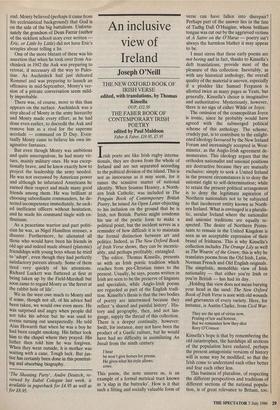An inclusive view of Ireland
Joseph O'Neill
THE NEW OXFORD BOOK OF IRISH VERSE edited, with translations, by Thomas Kinsella
OUP, f12.50
THE FABER BOOK OF CONTEMPORARY IRISH POETRY edited by Paul Muldoon
Faber & Faber, f10.95, £5.95
Irish poets are like Irish rugby interna- tionals, they are drawn from the whole of Ireland and are not separated according to the political division of the island. This is not as innocuous as it may seem, for it raises the sensitive matter of national identity. When Seamus Heaney, a North- ern Irish Catholic, was included in The Penguin Book of Contemporary British Poetry, he issued An Open Letter objecting to his inclusion on the ground that he is Irish, not British. Purists might condemn his use of the poetic form to make a political point, but the incident serves as a reminder of how difficult it is to maintain the formal distinction between art and politics. Indeed, as The New Oxford Book of Irish Verse shows, they can be inextric- ably, and perhaps profitably, entangled. The editor, Thomas Kinsella, presents us with an Irish poetic tradition which reaches from pre-Christian times to the present. Usually, he says, poems written in Irish are seen to be the preserve of linguists and specialists, while Anglo-Irish poems are regarded as part of the English tradi- tion. Kinsella's thesis is that the two bodies of poetry are intertwined because they reflect 'a shared and painful history'. His- tory and geography, then, and not lan- guage, supply the thread of this collection. There is a deeper continuity, however: Swift, for instance, may not have been the product of a Gaelic culture, but he would have had no difficulty in assimilating An Insult from the ninth century:
I hear he won't give horses for poems. He gives what his style allows: cows.
This poem, the note assures us, is an example of a formal metrical tract known as 'a slap in the buttocks'. How is it that such a fitting and socially valuable form of verse can have fallen into disrepair? Perhaps part of the answer lies in the fate of Tadhg Dall O'Huiginn, whose brilliant tongue was cut out by the aggrieved victims of A Satire on the O'Haras — poetry isn't always the harmless blather it may appear to be.
I must stress that these early poems are not boring and in fact, thanks to Kinsella's deft translations, provide most of the pleasure of this collection. Inevitably, as with any historical anthology, the overall quality of the material is uneven, especially if a plodder like Samuel Ferguson is allotted twice as many pages as Yeats, but generally, Kinsella's choice is imaginative and authoritative. Mysteriously, however, there is no sign of either Wilde or Joyce.
The omission of the cosmopolitan Joyce is ironic, since he probably would have agreed with the submerged political scheme of this anthology. The scheme, crudely put, is to contribute to the enlight- ened ideology favoured by the New Ireland Forum and increasingly accepted in West- minster, as the Anglo-Irish agreement de- monstrates. This ideology argues that the orthodox nationalist and unionist positions are destructive because they are mutually exclusive: simply to seek a United Ireland in the present circumstances is to deny the unionist right to self-determination; while to retain the present political arrangement is to deny the legitimate aspiration of Northern nationalists not to be subjected to that incoherent entity known as North- ern Ireland. What is envisaged is a pluralis- tic, secular Ireland where the nationalist and unionist traditions are equally re- spected. The desire of Northern Protes- tants to remain in the United Kingdom is seen as an acceptable expression of their brand of Irishness. This is why Kinsella's collection includes The Orange Lily as well as The Wearin' of the Green; this is why he translates poems from the Old Irish, Latin, Norman French and Old English originals. The simplistic, monolithic view of Irish nationality — that either you're Irish or you're British — has had its day.
_Holding this view does not mean burying your head in the sand: The New Oxford Book of Irish Verse is sore with old wounds and grievances of every variety. Here, for instance, is Austin Clarke, from Civil War:
They are the spit of virtue now, Prating of law and honour, But we remember how they shot Rory O'Connor.
Kinsella's hope is that by remembering the old catastrophes, the hardships all sections of the population have endured, perhaps the present antagonistic versions of history will in some way be modified, so that the Irish come to understand each other better and fear each other less.
This business of pluralism, of respecting the different perspectives and traditions of different sections of the national popula- tion, is of great relevance to Britain, too. The great influx from the old colonies must mean that the turbaned Sikh or the dread- locked Rastafarian is to be accepted as being just as British as the pin-striped Anglo-Saxon. This thought may prompt the gnashing of teeth in some quarters, but surely there is no alternative to a multi- cultural society?
The Faber Book of Contemporary Irish Poetry, edited by Paul Muldoon, presents us with generous chunks of the Top Ten Irish poets since the death of Yeats. This is a highly dubious format, but it does spare us the fragmented, worse-than-useless anthologising which offers the reader un- helpful glimpses of 50 poets.



















































 Previous page
Previous page